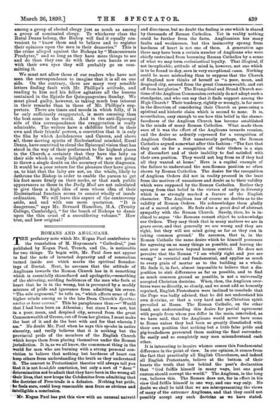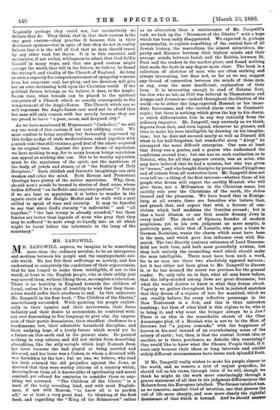ROMANS AND ANGL1C INS.
T"prefatory note which Mr. Kegan Paul contributes to the translation of M. Huysmans's "Cathedral," just published by Kegan Paul, Trench, and Co., is noticeable for two things. To begin with, Mr. Paul does not appear to feel the note of inverted depravity and of sensualism turned inside out which marks the spiritual flounder- ings of Durtal. Next, he assumes that the attitude of Anglicans towards the Roman Church has in it something which is essentially shamefaced and apologetic,---something of the shivering, scolding feebleness of the man who feels at heart that he is in the wrong, but is prevented by a muddy mixture of pride and ignorance from admitting his errors. "The sole argument," he tells us, "which affects some of the higher minds among us is the late Dean Church's Spartani nactus es hanc exorna." This he paraphrases thus :—" Would that I had been born an Athenian ; but since I was not, but in a poor, mean, and despised city, severed from the great Commonwealth of Greece, cut off from her glories, I must make the best of it and do the best with and for that wherein I am." No doubt Mr. Paul when he says this speaks in entire sincerity, and verily believes that it is nothing but the provincial pride of the members of the English Church which keeps them from placing themselves Tinder the Roman jurisdiction. It is, as we all know, the commonest thing in the world for men who are burning with a strong personal con- viction to believe that nothing but hardness of heart can keep others from understanding the troth as they understand it. The convert to Protectionist theories will always tell you that it is not bo fui-ficle conviction, but only a sort of " dour "
• determination not to admit that they have been in the wrong all their lives, that now keeps the Cobdenites from admitting that • the doctrine of Free-trade is a delusion. Nothing but pride, he feels sure, could keep reasonable men from se obvious and intelligible a conclusion.
Mr. Began Paul has put this view with an unusual naïveté
and directness, but no doubt the feeling is one which is shared by thousands of Roman Catholics. Yet in reality nothing could be further from the facts. Anglicanism has many faults and weaknesses, but this insincerity sprung from hardness of heart is not one of them. A generation ago there may have been a certain number of Anglicans who were chiefly restrained from becoming Roman Catholics by a sense of what we may term ecclesiastical loyalty. That illogical, if not inexplicable, attitude of mind is, however, not one which is to be found to-day, save in very exceptional cases. Nothing could be more misleading than to suppose that the Church of England now thinks of herself as "a poor, mean, and despised city, severed from the great Commonwealth, and cut off from her glories." The Evangelical and Broad Church sec- tions of the Anglican Communion certainly do not adopt such a standpoint, and who can say that it finds support among the High Church ? Their tendency, rightly or wrongly, is far more in the direction of considering their Church as possessing a spiritual and historic claim which is second to none. It is, nevertheless, easy enough to see how this belief in the shame- facedness of the Anglican Church has become established in the minds of many Roman Catholics. What made them sure of it was the effort of the Anglicans towards reunion, and the desire so ardently expressed for a recognition of Anglican Orders. Not unnaturally perhaps, the Roman Catholics argued somewhat after this fashion : 'The fact that they ask us for a recognition of their Orders is a sign of discomfort and of their inability to feel satisfied with their own position. They would not beg from us if they had all they wanted at home.' Here is a capital example of the failure to understand the non-Roman position so often shown by Roman Catholics. The desire for the recognition of Anglican Orders did not in reality proceed in the least from the motives of uneasiness and doubt as to their validity which were supposed by the Roman Catholics. Rather they sprang from that belief in the virtues of unity in diversity which is so strongly marked a feature of the English character. The Anglican has of course no doubts as to the validity of Roman Orders. He acknowledges them gladly as of a sacred origin. He feels also a great deal of abstract sympathy with the Roman Church. Surely, then, he is in- clined to argue the Romans cannot object to acknowledge our Orders. They may think that in many matters we are in grave error, and that generally we are wrong and they are right, but they will not mind going as far as they can in taking common ground.' He assumes, that is, in the Roman Catholic the same desire which he himself possesses for agreeing on as many things as possible, and leaving the rest over as matters beyond human control. He does not perceive that the Roman "I am wholly right and you are wrong" is essential and fundamental, and applies as much to every grain of mortar as to the building as a whole. He finds it, in fact, almost impossible to believe that a dis- position to sink differences as far as possible, and to find as much common ground as possible, is not a universally accepted Christian doctrine. When, then, the Anglican over- tures were so directly, so clearly, and we must add so honestly repulsed, English Protestants were inclined to conclude that the Pope was badly advised, that he did not understand his own doctrine, or that a very hard and un-Christian spirit prevailed at Rome. The Roman Catholic, on the other hand, not understanding this desire for partial agreement with people from whom you differ in the main, concluded, as we have said, that the Anglicans would never have come to Rome unless they had been so greatly dissatisfied with their own position that nothing but a little false pride and pig-headedness prevented them making the final surrender. So easily and so completely may men misunderstand each other.
It is interesting to inquire whence comes this fundamental difference in the point of view. In our opinion, it comes from the fact that practically all English Churchmen, and indeed all English Protestants, believe at the bottom of their hearts the truth that lies behind the poet's declaration that "God fulfils himself in many ways, lest one good custom should corrupt the world." The Anglican, in the long run, believes this. The Roman does not, for in effect in his view God fulfils himself in one way, and one way only. No, doubt we shall be told that we are misrepresenting tbe views of many of the extremer Anglicans, and that they could not possibly accept any such doctrine as we have stated.
Logically perhaps they could not, but instinctively we believe they do. They think, that is, that their custom is the one good custom—they practise it because this is their deliberate opinion—but in spite of that they do not in reality believe that it is the will of God that no man should travel by any other road but theirs. It is in this essential and instinctive, if not verbal, willingness to admit that God fulfils himself in many ways, and that one good custom might corrupt the world, that will in the future, we believe, be found the strength and vitality of the Church of England. As long as such a capacity for comprehensiveness of sympathy remains hers, her corporate zeal, her piety, and her devotion will give her an ever-increasing hold upon the Christian world. If the political future belongs, as we believe it does, to the Anglo- Saxon race, what bounds can be placed to the spiritual conquests of a Church which so exactly corresponds to the temperament of the Anglo-Saxon. The Church which can so well represent the Anglo-Saxon race need not be afraid that her sons will only remain with her merely because they are too proud to leave "a poor, mean, and despised city."
As we have mentioned M. Huysmans's "Cathedral," we will Bay one word of this curious if not very edifying work. We must confess to being anything but favourably impressed by this hodge-podge of stale medimvalisms, raked together with a muck-rake that still retains a good deal of the odour acquired in its original uses. Against the purer forms of mysticism we have nothing to say, for to many human beings mysticism can appeal as nothing else can. But to be worthy mysticism must be the mysticism of the spirit, not the mysticism of the body, of jewels and stones, or of "the Bestiary of Holy Scripture." Such childish and fantastic imaginings can only weaken and relax the mind. Both Roman and Protestant theology have plenty of the nobler mysticism. Why, then, should men's minds be turned to stories of dead nuns, whose bodies diffused "an ineffable and exquisite perfume" P Surely if we are bent on mysticism it is better to wander in the mystic circle of the Religio Medici and to walk with a soul skilled to speak of time and eternity. It may be fanciful to say that since God's eternity "is indivisible " and "all together," "the last trump is already sounded," but these fancies are better than legends of nuns who pray that they may be suffered "to melt away, to liquefy into an oil which might be burnt before the tabernacle in the lamp of the sanctuary."







































 Previous page
Previous page